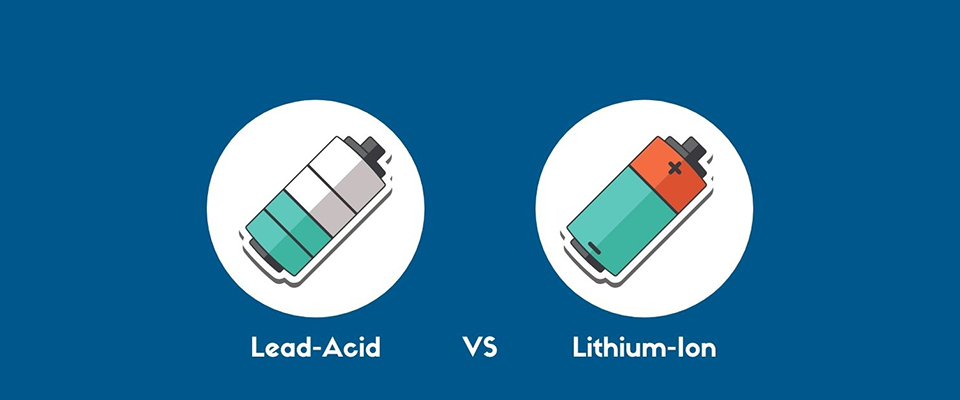Overview
Finding a suitable battery for our solar energy system is quite important. In this article, let’s compare lead-acid batteries and lithium batteries, which are the two main battery types used in the solar energy system, and discuss which is a better choice.
Part 1. An Introduction to Lead-Acid and Lithium Batteries
There are three main battery types we can select while building a solar system, which are flooded lead acid, sealed lead acid, and lithium batteries.
Flooded Lead Acid (FLA)
The distinguishing feature of FLA batteries is that their electrodes are submerged in water. To maintain optimum performance, FLA batteries need to be checked regularly and refilled every one to three months.
Failing to upkeep them properly can significantly shorten their lifespan. Additionally, they are not sealed, so they must be installed in a ventilated enclosure so that battery gases can escape.
Sealed Lead Acid (SLA)
Sealed lead acid batteries have two types: Gel and Absorbent Glass Mat (AGM). They are both spill-proof and require minimal maintenance. And AGM batteries are more commonly used in the solar system.
AGM battery is a lead-acid battery in which the electrolyte is absorbed into a fiberglass mat, reducing its internal resistance. Therefore, AGM batteries can handle higher temperatures and self-discharge more slowly than other batteries. This also makes them more efficient.
AGM batteries also have other advantages: they can withstand a large temperature range, have a long lifespan, and are safe to use without spilling toxic fumes.
Lithium Batteries
Compared to FLA or AGM batteries, lithium batteries can carry deeper cycles. Lithium batteries are a wonderful choice for portable energy storage because they are lightweight and compact. What’s more, they lose less capacity when they sit idle, which is good for solar backup systems that use energy occasionally.
Part 2. What to Consider While Choosing a Solar Battery
Cycle Life
When we discharge the battery and then recharge it with our panel, this process is called a single charge cycle. The number of charge cycles is an important factor when we measure the lifespan of a battery.
Cycle life is also related to the depth of discharge. The deeper a battery is discharged, the more stress is put on it, and the shorter its cycle life.
Depth of Discharge
Depth of discharge refers to how much capacity of a battery is used before charging it. Batteries have a recommended depth of discharge. Exceeding the recommended DoD may negatively affect batteries’ performance and lifespan.
For lead-acid batteries, it is recommended not to run to a depth of discharge beyond 50%. However, lithium batteries can handle a depth of discharge of 80% or higher.
Charge Rate
Lithium batteries can handle higher amperage from chargers. This means they can be recharged faster than lead-acid batteries.
However, the charging current lead-acid batteries can handle is limited. This is mainly because they will overheat if charged too fast. Also, when full capacity is reached, the charging rate will slow down significantly.
Efficiency
Lithium batteries perform better in efficiency. This means more solar energy can be stored and used.
Lead-acid batteries are only 80% to 85% efficient, depending on the condition and model. Lithium batteries, on the other hand, are higher than 95% efficient. Higher efficiency means the batteries charge faster. It could also mean that we can buy fewer solar panels and save more money.
Environmental Friendliness
Compared to lithium batteries, lead-acid batteries require a large amount of raw material to provide a similar level of solar storage capacity. More raw materials can cause more carbon footprints.
While the lithium in lithium batteries comes from mining, less material is required for each cell, thus minimizing environmental impact.
Summary
Through the above explanation, we have learned that lithium batteries have many advantages, such as a long lifespan, a high depth of discharge, and so on. Lithium batteries are the better choice in most scenarios. And we should also understand that whether to use lithium batteries or lead-acid batteries should base on our specific needs.
At Polinovel, you can choose many reliable lithium batteries according to your needs or personal preference.
Company
Application
Product
Get in Touch
1010 Longnian Bld, 29 Longcheng Ave, Nanlian Area, Longgang St, Longgang Dist, Shenzhen, China 518116
+86 755-28906569
[email protected]
Get our updates, please contact us through one of the following channels.



